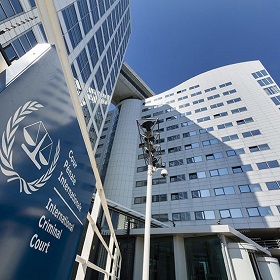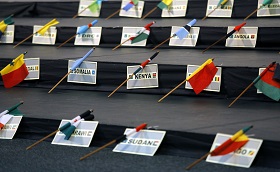Recent events surrounding the International Criminal Court are indicative of broader issues and trends, including the acrimonious relationship between the ICC and Africa, as well as between the institution and the international community at large. Heavily criticized by many and praised by few, the ICC finds itself at a turning point. Will it reinvent itself or fade away?
For the Hague-based International Criminal Court (ICC) this autumn has in many ways been an eventful one. On the one hand, the Court has successfully ended a landmark case treating the destruction of cultural values in Timbuktu as a war crime while simultaneously breaking new ground by convicting and sentencing an Islamic militant to nine years in prison. On the other hand, in the past several weeks the Court has come under unprecedented pressure. As a corollary to years of progressively growing criticism of the ICC as being unfairly focused on Africa, several African states—Burundi, South Africa, and Gambia — announced they would pull out of the institution leaving the door open for other countries to follow suit. Now in its 15th year and holding a mixed record, the ICC faces an uncertain future, which is all the more reason to reflect on where the Court has come from and where it is headed.
Court of Last Resort
Before its creation in 2002, the International Criminal Court was decades in the making. One can trace its roots back to the 1899 and the 1907 Hague Conventions, the Nuremberg and Tokyo Trials, as well as the 1948 Convention on the Prevention and Punishment of the Crime of Genocide, which established ‘war crimes’, ‘crimes against humanity’, and ‘genocide’ as categories of international law. The idea of a permanent international criminal court gained traction after World War II, but was sidelined due to Cold War divisions, and it took the swift unraveling of Yugoslavia and the genocide in Rwanda to bring international criminal justice to the fore once again. The ad hoc Tribunals for Rwanda and the former Yugoslavia essentially served as prototypes and laboratories for what following the adoption of the Rome Statute in 1998 became the ICC.
Today, the Rome Statute has 124 States Parties with countries like the United States, Russia, China, and India notably either not having signed or ratified it. Importantly, in the spirit of protecting state sovereignty, the bedrock of the ICC has always been the principle of complementarity, making it a ‘court of last resort’ and allowing it to only admit cases where national authorities are either unwilling or unable to carry out a fair trial. Once these conditions have been satisfied, the ICC can launch investigations into any State Party, and if a state has not ratify the Statute, it is up to the Security Council to refer the case to the Court. Its core mission is simple and grand: to put an end to impunity for the perpetrators of the most serious crimes – crimes against humanity, war crimes, and genocide. Ultimately, it is a legal institution and as such it is expected to always put justice above everything else. This, however, has had important implications not only for the ICC but for various other international actors as well.
Justice First
The sharp increase in the number of internal armed conflicts after the Cold War—many of them intractable—prompted a search for new analytical frameworks designed to achieve sustainable or ‘positive’ peace. This led to the formulation of the so-called ‘peace or justice’ dilemma stating that despite the importance of both, peace and justice cannot necessarily be pursued simultaneously. Conflict and post-conflict environments are notoriously complex, tensions are high, and with a relapse into fighting an ever-present possibility, untimely judicial interventions like indictments or mass prosecutions—says the ‘peace camp’—could potentially undermine a fragile peace.
The ICC, however, has tended to stand on the “justice first” side of the argument. The Court’s vision is informed by several key ideas.
Firstly, ignoring demands for justice causes a boomerang effect: the peace that comes out of political deals is often stillborn and temporary, and violence soon breaks out again. This is what happened in Rwanda. In 1993, a year before the genocide, the Tutsi Rwandan Patriotic Front and the Hutu Rwandan government signed the Arusha Accords, which helped stop the violence, but did not go beyond power-sharing. Without justice, reconciliation, or treatment of the root causes, in 1994 the conflict started anew, tacking the lives of a million Tutsis.
Secondly, the promotion of justice is supposed to serve as a deterrent and means of preventing future atrocities in what has often been called ‘the shadow of the Court’ effect. According to this line of reasoning, properly enforcing international criminal law would provide a clear line in the sand, and potential wrongdoers would then know that unlawful acts have legal consequences.
Thirdly, it has been suggested that indictments and stigmatization of criminals would cause them to lose international and local support, marginalize them, and push towards compromise.
Lastly, the ICC considers justice to be critical because failure to deliver it breeds a culture of impunity. It sets the wrong precedent and encourages new crimes by letting criminals walk away. Moreover, as has been argued by Harvard University’s Kathryn Sikkink, the prosecution of atrocities helps generate “respect for human rights and rule of law in both the short and long-term”. Delivering justice early on produces what she calls a “justice cascade” – a transnational ripple effect replacing impunity with accountability.
Opposition to the ICC
Not everyone agrees. Notably, the approach of the ICC has drawn the ire of mediators and other actors involved in peacebuilding and conflict resolution. Critics usually refer to the cases of Omar al-Bashir, the President of Sudan, and Joseph Kony, the notorious leader of the Lord’s Resistance Army. In 2009, the ICC Prosecutor indicted Bashir citing his involvement in the crimes in Darfur in the expectation that this move would isolate him and facilitate his arrest. In reality, however, it has had the exact opposite effect. The indictment received condemnation from the African Union (AU) and since then Bashir has safely visited over 15 countries, all refusing to surrender him to the ICC. The indictment hardly helped to isolate Bashir, to make progress on Darfur, or to deter further abuses. In fact, Bashir—knowing he can expect little else than a trial in the Hague—now has little incentive to negotiate. As put by Jack Snyder in the Economist debate on the same topic, the threat of justice tends to de-incentivize military and political leaders from relinquishing power and negotiating peace, and many mediators now face serious difficulties as they realize that oftentimes there is nothing they can do to move the process along.
Therefore, critics argue that it is necessary to cut deals with perpetrators of abuses, however unsavory the idea might be. Alex de Waal, a vocal advocate of this approach, in 2012 opined that justice and the ICC needed to take a back seat to striking political settlements. He argued that the cooperation of «wrongdoers» was often necessary to put an end to hostilities, and that making a deal could precipitate the end of the conflict and save people’s lives that would otherwise be lost.
In Search of a New Strategy
Conflict resolution methodology aside, it would be fair to say that in the 14 years it has been around, the ICC has made too few friends and too many enemies. China did not sign or ratify the Rome Statute because of its traditional concerns about external interference in states’ domestic affairs and close ties with states like Sudan and Libya that were eventually targeted by the ICC. Russia did not ratify the Statute and over the years has questioned the activities of the Court, including the outcome of the 2010 Kampala Review Conference that criminalized aggression, as well as the Court’s investigation of crimes committed, as the ICC puts it, “in and around South Ossetia” in 2008.
To this one has to add the difficult and often strange relationship the ICC has had with the United States. From actively supporting the idea of an international criminal court in the 1990s, under the Bush administration the US went on to severely criticize it, prohibit all national cooperation with the ICC, and launch a global campaign for bilateral immunity agreements that would protect American troops abroad [1]. Then in 2005 the US tacitly accepted the UN Security Council referral of the Bashir case to the Court (likely because the US realized the ICC posed it no threat), and the US attitude towards the Court has been moderately warm since [2]. In fact, even to a point where it becomes bizarre: when in October 2016 Burundi announced it would withdraw from the ICC, the US— itself not a member — expressed concern about Burundi’s decision. And now that there are reports of the ICC preparing its first investigation into war crimes and crimes against humanity in Afghanistan, the relationship might change again soon.
The ICC’s most acrimonious relationship, however, has been with Africa. Nine out of ten active investigations of the ICC happen to be in Africa, and it is there that the Court has been most active. The case of Omar al-Bashir provoked a significant backlash among African rulers adamantly opposed to indictment of sitting heads of state, which, in turn, prompted discussions about ICC’s “Africa bias”, “Western justice”, and neocolonialism, its “race-hunting” against the continent and the Court’s obstruction of local ownership of justice. The African Union tends to echo these concerns, promoting the view that “peace is justice in itself”, as well as emphasizing “African solutions to African problems”. And recently, Burundi, South Africa, and the Gambia decided to withdraw from the Court. Burundi cited concerns about sovereignty, South Africa disagreed with the ‘interpretations’ the ICC gives to the means of peaceful conflict resolution, while the Gambia said the ICC “ignored war crimes” and called it “an International Caucasian Court for persecution and humiliation of people of color [and] especially Africans”. All these decisions and pronouncements fit squarely into the anti-Court narrative.
The reason for its preoccupation with Africa is that, at the end of the day, lacking resources and political will, the Court cannot possibly prosecute everyone – it can only hope to deter. Even though atrocities are certainly not limited to the continent and occur in the Middle East, Latin America, South Asia, and elsewhere, the Court has to pick its battles and operate where it can. Putting only African criminals on trial is, of course, not enough and not fair. But for the Court, Africa—still relatively absent from the geopolitical radar of great powers—is a low-hanging fruit.
It then becomes obvious that the Court is facing structural constraints and limitations that are unlikely to disappear. Nevertheless, recent developments seem to have provoked some soul-searching within the ICC. First of all, there is talk of a new criminal case being opened in Afghanistan, which could help fix the anti-African image of the Court. Secondly, in September 2016 the ICC Prosecutor Fatou Bensouda published an important policy paper on case selection and prioritization. Based on the document, the Court appears to be inserting itself into new areas where it would deal with less political opposition and where it could potentially reinvent itself. This could mean prosecuting cases related to destruction of cultural values in places like Mali or cases of environmental destruction that the ICC has on several accounts promised to investigate.
In these areas the ICC could indeed potentially make a difference, but there is still likely to be pushback and criticism. In the short-term it is also possible that we will see more countries leaving the Court. The President of Uganda Yoweri Museveni has already said that Uganda “has lost interest in the ICC”, Namibia has signaled it might leave, and Kenya could do so, too, given that in 2012 the ICC had charged the current Kenyan president Uhuru Kenyatta with crimes against humanity, but since then has dropped the case, because Kenya failed to provide “vital evidence”.
Nevertheless, the long-term future of the Court as of now is not under threat. Apart from a few notable exceptions, it is still strongly supported in the West and even among African states attitudes are not uniform: Botswana, for instance, has “regretted” South Africa’s decision to withdraw. To remedy the situation, the Court needs to develop a solid strategy, which would involve extra care in the choice of its cases, fixing the current regional imbalance, and general attempts to come across as more evenhanded and equidistant. Ultimately, the ICC was never going to be the once envisioned universal jurisdiction court, and it is certainly not going to become one soon. It is an imperfect institution, and to become stronger, it needs to embrace this.
1. Schabas, W. An Introduction to the International Criminal Court. Cambridge University Press, 2004. p. 25.
2. Ibid. p. 30.
3. Schabas, W. An Introduction to the International Criminal Court. Cambridge University Press, 2004.
4. Peace versus Justice? The Dilemma of Transitional Justice in Africa. Ed. By Chandra Sriram, Suren Pillay. University of KwaZulu-Natal Press, 2010.
5. Hayner P. Unspeakable Truths: Confronting State Terror and Atrocity. Routledge, 2001.








